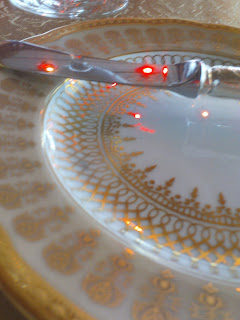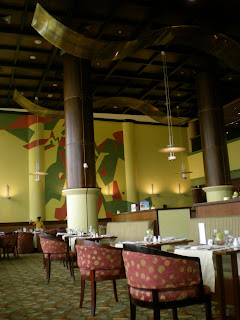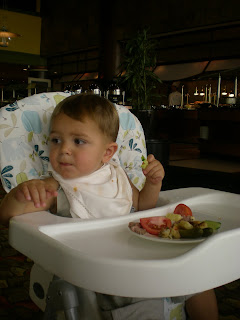
 |
| Qatayef Asafiri bil Kashta: Qatayef with Cream |
Shangri-La: the mere mention of the place is enough to evoke images of a grand utopia or earthly paradise. Despite the reality being that Shangri-La does not and never did exist as it does in
James Hilton's novel, people have happily adopted the concept as something that conjures up the essence of an intrinsic desire for the sublime. Appropriately, one of Abu Dhabi's best known luxury hotels is called the
Shangri-La, and for all the hype and money that surrounds and flocks to it, you'd expect it to be no less than a place where you no longer age. So you can imagine my surprise when the hotel and the Iftar buffet at the "legendary" Shangri-La in Abu Dhabi was, well...underwhelming.
* * *
Paradise Lost.
Matt and I walked in dressed for a celebratory anniversary dinner only to find every short-wearing-tourist, local and their screaming-newborn-child scarfing down buffet-piled plates of semi-bland food in a shocking display of outright I-don't-even-know-what. Let me revise that slightly: going to Iftar at a hotel was probably a bad idea to begin with because Iftar is usually a family affair, where friends are invited and food is consumed in a jovial but not race-you-to-the-dessert-station kind of way.
What I hated about it was the feeling that you were racing everyone around you to the buffet, racing them to finish your first, second and even third plate, getting more food than you could possibly consume, and delighting in not consuming it. At one point I saw a man with a plate of nearly 20 ice cream scoops pass me. At another point I found myself shamelessly shoving chocolate covered marshmallows into my mouth, fresh from one of the 3 chocolate fountains. And even when I could eat no more, I managed to force-feed myself an extra couple of sour-gummy-candies, mounted on peg displays for easy access.
What I loved about it was the informal, haphazard and somehow familial feel to it. Entire, large families were sitting at tables together, eating, celebrating - from the wide awake newborns to the proud grandparents - and this at 9pm. After having spent Roman's first year in London, where highchairs are about as scarce as good service at restaurants and all children are banished to their bedrooms promptly at 7, I'd spent a lot of time feeling like a misfit and unfit parent for wanting to take our little one out to dinner now and again. The Emiratis embrace their children as part of every aspect of the day, and that's something I can admire. I loved seeing traditional Emirati cuisine prominently displayed and the fact that every table had its own date receptacle, so that you might break the fast traditionally (dates and milk, like the Prophet).
* * *
Qatayef Found.
Sadly, without warning, about 30 minutes into our meal they suddenly and abruptly took down all the Emirati food and replaced it with the normal hotel buffet dinner food, leaving me, once more, without a taste! I didn't get to have any of the whole roasted baby lamb served over rice, or any of the many interesting soups and stews next to it. But I did have some Umm Ali again (it was better at the Raha Beach Hotel buffet) and plenty of one of my new favorite desserts: Qatayef.
To me, Ramadan might not mean fasting or even that much feasting, but it has definitely meant new beginnings. It seems that to recover from a full day of no food or water, Muslims pull out all the stops with regards to culinary splendor during the holy month. And so, to celebrate Ramadan (as much as a Catholic girl might), here is a list of my 4 newly discovered, deliciously appreciated Arabic (Ramadan) Sweets. I have had the pleasure to indulge in them almost every day so far because all the major supermarkets set up special tents in their bakery section just to sell Ramadan sweets. Roman and I are regulars now, and that is saying a lot for a mother-son duo with not a sweet tooth in sight.
* * *
Roman and Brenda's Top 4 Favorite Ramadan Sweeties
Oh, Matt kinda likes them too. :)
My Lu-Lu Supermarket spoils: qatayef, anonymous sweet, Awamat
I have to admit, I hate baklava in all its syrupy-sweet glory. I was therefore highly suspicious when faced with a giant tent of baklava-esque sweets. Arabic sweets draw heavily from the phyllo-honey-nut concept, and you'd think the variations would be tiresome, but they aren't! I don't know how but all these sweets somehow incorporate honey, nuts, phyllo, cheese or cream and they are all different and uniquely delicious. They also include a lot of rose and orange blossom water which is a flavor people in the West generally neglect, to their loss, if you ask me. If you have an Arabic sweet shop near you, I highly recommend you go in and have a try, despite the unfamiliarity and vastness of the counter display. The sweets are rich, but the portions are generally small - which means you can try 2 or 3...or 4 or 5. :)
Small Disclaimer: The spellings of these desserts vary as they are obviously transliterated into English from Arabic, but I've done my best to use the ones I see here in the UAE.
4. Muhallabia: Milk Pudding is good for the Soul
I have known of this sweet for some time because it is one of my mother's favorite desserts. Being obsessed with Lebanese food as she is, she ordered it every time we ate at
Noura, her namesake restaurant, in London. At most posh restaurants you are served this dessert in a glass bowl, but during Ramadan you can find it in the sweet tent being cut with a small knife into small squares which you cart off on a small plate. I prefer this snack-y way of serving it, actually, because it is usally at room temperature which seems to suit the dish.
This is a unique pudding in my mind because it is like a primer in Arabic desserts: it is made from milk, rice powder and cornstarch - so simple - but flavored with rose water and orange blossom water and then sprinkled with the deliciously ubiquitous pistachios (or "pista" as they say here). It has the consistency of a creamy jell-o if you can image that, but is much more sophisticated. I also find it cleanses my palate nicely, in preparation of the next sweets...
 |
| Roman's Favorite: Awamat |
3. Awamat: Little fried lighter-than-doughnut-balls
(Also called Lokma in Turkey) This is one of Roman's favorites. Everytime we go up to the sweet tent, he inevitably gets away with one of these firmly gripped in his little hand - and believe me when I say that is a treat in and of itself, because these things are HEAVILY slathered in honey and sugar syrup. Lots of fun for me to clean up.
But in all seriousness, these are wonderful little sweets not just because they look unctuously delicious but because they are. While they may appear to be honey-soaked doughnut balls, they are significantly lighter than donut holes. These small little balls are crispy on the outside but delicately doughy on the inside. They are sweet but not as sweet as they look, which is why I like them. Maybe this has to do with the use of yogurt in their dough.
2. Arabic Cheese Sweet: Vague Name, Delicious Sweet
I am still convincing myself that I actually did see and eat this, so hard is it to find and describe and therefor get a name for. It's a hard business speaking to supermarket and bakery employees, most of them not Middle Easter, and begging for help with a recipe, name or origin of a sweet. Alas, the best I can do is "Arabic Cheese Sweet" because that's what it is.
This sweet is made with Akawi cheese, a Levantine cheese that is semi-soft. The cheese is melted and then mixed with a sugar syrup and semolina to create a strangely pliable, delicious dough that is filled with cream. It can be rolled in pistachios or left on its own, like I had it.
This is the only recipe and picture I could find, and it does not do it justice, but we will make do.
PS: If anyone knows what this is called, I'd be much obliged!
1. Qatayef: The Holy of Arabic-Sweet-Holies.
These little pancakes won my heart in about a nanosecond when I first read about them on
Anissa Helou's blog post about Ramadan sweets. Qatayef are
the sweet to eat during Ramadan and whether you make them at home or buy them premade and packaged on a Styrofoam tray with cling film over it at the supermarket (a common practice), they are delicious.
These sweets vary from the regular and stereotypical Arabic sweet in that they are actually yeast-risen pancakes. And because you know how much Matt and I love our pancakes, you know that I had my grubby little hands all over these as soon as I saw them. I got all the different flavors and kinds - deep fried and not deep fried. And of course I obsessively took pictures of them and even brought some to a new friend's house the other day.
You can make them the size of a silver dollar, but here they are more the size of your palm, so they deep-fried end product is really the size of a one-per-person portion. But I can never have just one. Or two, actually. :) And by God, I will make it to the
Ramadan Brothers stand in Damascus one day (Thanks Anissa for the tip)!
* * *
Honorable Mentions:
These are delicious and delicious looking - they just aren't my absolute favorites. Given the chance, though, I would totally scarf them down before dinner.
Kunafa: a typical Ramadan dessert of shredded sweetened phyllo dough and filled with cheese; thought to have originated in Palestine. (
image credit)
Basbousa: A delicious almond semolina cake often cut into little diamonds, as seen here. (
image credit)
Jalebi: fried pretzel looking things which are actually fried and sugar-coated batter. This dessert is particularly popular in India and Pakistan for celebrations. (
image credit)
Bamieh: A Persian dessert that look like mini-churros but are nutty tasting and slightly heavier, also soaked in a sugar syrup / honey. Delish. (
image credit)
* * *
Qatayef Asafiri Bil-Kishta
Makes 12
Qatayef are different from American pancakes because they use yeast instead of baking powder, and therefore require resting time. The batter is also more like a dough making them tricky little buggers to fry in a perfect circle! Lastly, they are only cooked on one side, while the other is allowed to bubble and dry while on the pan, whereas American pancakes are flipped. I cheated a little and flipped mine because the first couple of tries I used far too much dough.
The Qatayef you see most during Ramadan, from my limited experience here in Abu Dhabi, are the deep-double-fried ones. They look like empanadas soaked in sugar syrup but are much tastier because they are made from small pancakes (much moister than an empanada pastry) and are indeed soaked in a sugary syrup. They are stuffed with either an Arabic clotted cream called "Kashta," unsalted cheese (like ricotta), or a nut mix (usually walnuts, almonds or pistachios). I would be lying if I said I did not love these, especially the ones filled with cream or unsalted cheese.
But my other favorite Qatayef is a fresher, less deep-fried-y version of the sweet: the freshly made qatayef pancake filled with kashta which is flavored with rose and orange blossom water and topped with roughly chopped pistachios and just a drizzle of sugar syrup. I think it's the perfect ending to a Middle Eastern Iftar meal - or any meal for that matter.
Ingredients
Syrup:
1/2 cup granulated sugar
1/2 tsp of rose water
1/2 tsp orange blossom water
1/4 cup water
1 tsp lemon juice (or to taste)
Batter:
1/2 tsp dry active yeast
1/2 cup + 2 tbsps warm water
3/4 cup all-purpose flour
pinch of salt
Filling:
4 oz (113g) ricotta cheese
1 1/2 tsp rose water
2 tsp granulated sugar
1 1/2 tsp lemon juice (or to taste)
Garnish:
1/2 cup roughly chopped pistachios
1/2-3/4 cup vegetable oil for frying
Method:
1. Make the syrup by combining the water, sugar and lemon juice in a small pot and slowly bringing to a boil. Allow it to boil a minute or two while stirring and then add the rose and orange blossom water, stirring and then removing from heat. Allow to cool completely and set aside.
2. Combine yeast and warm (not too hot your hand can't go in it) in a bowl and allow to activate for 10 minutes. Then whisk in the flour and salt until you have a smooth dough. Set aside in a dark, dry place and cover with a damp cloth. Allow the dough to rise for 1 hour.
3. Meanwhile, make the filling by combining all the filling ingredients in a small bowl. Refrigerate. Chop the pistachios and set aside.
4. Once the dough is ready, heat a pan and grease it with 1/2 the vegetable oil over medium heat. Once the pan is hot, measure 1 rounded tbsp of dough onto it, spreading it into a small circle about 3 inches wide and 1/4 inch thick. The dough is sticky and tough to spread so don't be afraid to press down with the spoon until you achieve the desired thickness and shape.
Allow the qatayef to cook until the top has bubbled and dried, but do not keep it on too long as these pancakes are lighter than American ones and will become tough.
5. Repeat step 4 until the dough is used up, replenishing the oil as necessary and placing the qatayef on a clean plate with paper towels to drain the oil as you go.
 |
| My wonky little qatayef; beginner's charm, I always say. |
6. When ready to assemble (right before eating them, ideally): hold the qatayef in the palm of your hand and place 1 tsp full of the ricotta filling in it. Pinch one side of the qatayef closed. Do this with as many qatayef as desired.
7. Drizzle the sugar syrup over them (or simply serve on the side for people to doll out themselves) and sprinkle with a generous amount of chopped pistachios. Enjoy!
* * *
Ramadan Kareem!
Translation: "Ramadan is generous" - this alludes to the spirit of good-doing and generosity Muslims all over the world are taught to undertake during this month of fasting.







































